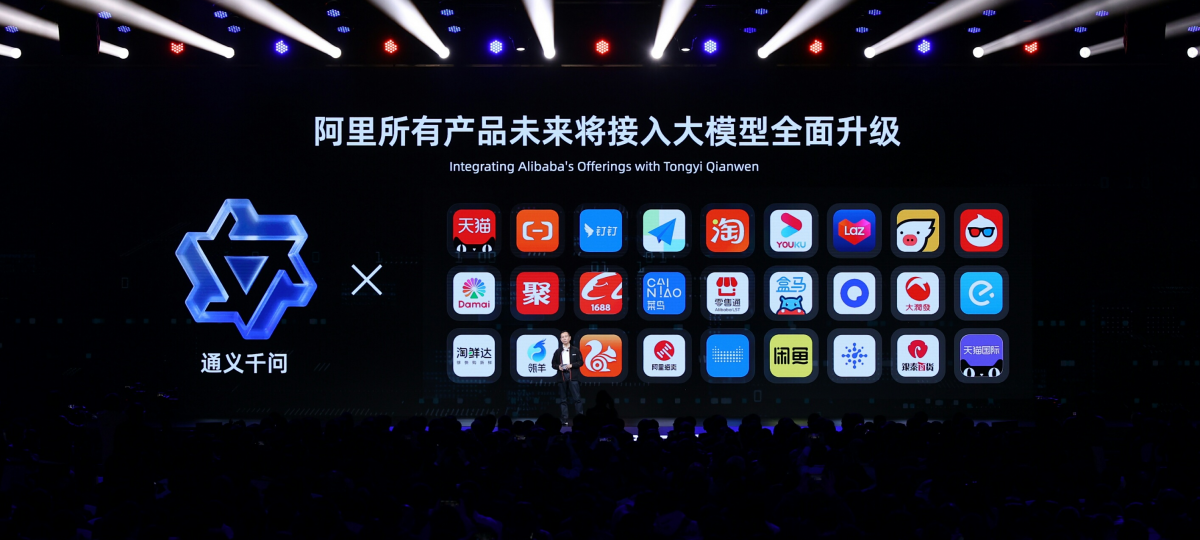
Photo credit: Shutterstock
Alibaba Group’s cloud computing arm unveiled an artificial intelligence model on Tuesday that can help corporate users perform tasks, from drafting business proposals to polishing essays.
The internet platform company will embed the large language model, dubbed “Tongyi Qianwen”, roughly translated to “truth from a thousand questions”, into applications across Alibaba’s ecosystem. Corporate clients and developers will also have access to the model and can finetune it to build their customized large language models.
“We are at a technological watershed moment driven by generative AI and cloud computing, and businesses across all sectors have started to embrace intelligence transformation to stay ahead of the game,” said Daniel Zhang, Chairman and CEO of Alibaba Group and CEO of Alibaba Cloud Intelligence, in a statement.
The generative AI model launch marks Zhang’s first major product unveiling since he took charge of Alibaba Cloud this year. The AI technology has made waves across the globe in recent months with its promise to transform content creation and boost productivity in fields from finance to marketing.
Alibaba Cloud has opened up registration for companies to test the AI model. The model can respond to text in Chinese and English and will develop image recognition and text-to-image capabilities in the future, according to the Hangzhou-based company.
AI-powered Ecosystem
Alibaba said it plans to have all applications across its ecosystem run on the large language model to provide a better user experience.
Research agency Gartner predicts that by 2025, 30% of marketing messages from large organizations will be synthetically generated, up from less than 2% last year.
Alibaba’s enterprise communication platform DingTalk and intelligent voice assistant Tmall Genie are piloting the newly unveiled model.

In a demo streamed by Alibaba Cloud, it showed that the model can power DingTalk to perform tasks such as generating meeting notes, creating campaign ideas and proofreading DingTalk documents. The AI-powered platform can also turn a hand-drawn sketch into a mini-app in seconds.
Alibaba’s smart speaker Tmall Genie will leverage the model to provide a more personalized user experience, from creating children’s bedtime stories to recommending background music for a workout.
The company is planning to embed the model into its e-commerce, search, navigation and entertainment applications in the future.
Corporate Accelerator
Alibaba Cloud said it will give corporate users access to the model on the cloud and allow them to train the model on their industry-specific datasets to meet business needs.
“We hope to facilitate businesses from all industries with their intelligence transformation and, ultimately help boost their business productivity,” said Zhou Jingren, Alibaba Cloud’s Chief Technology Officer.
Big AI models are power-hungry. Researchers estimated that it will take 355 years to train GPT-3, Open AI’s large language model, on the fastest graphics processor unit on the market and cost $4.6 million for training.
With Alibaba’s model available on the cloud, corporations can bypass the energy-intensive and time-consuming pre-training processes and build their customized models to support functions such as customer services and voice assistants.
Developers will also have access to the model that can help them create AI applications at scale.
At a press conference in Beijing, Alibaba Cloud said it will offer free trials of its core products, including its Elastic Compute Service and PolarDB databases, for up to three months to make computing resources more accessible for developers in China.
“The imagination of one corporation is limited after all; the unleashing of AI’s potential requires countless to explore,” said Zhang that heads Alibaba Cloud.
For more stories on technology across Alibaba’s ecosystem, go to our tech page here




